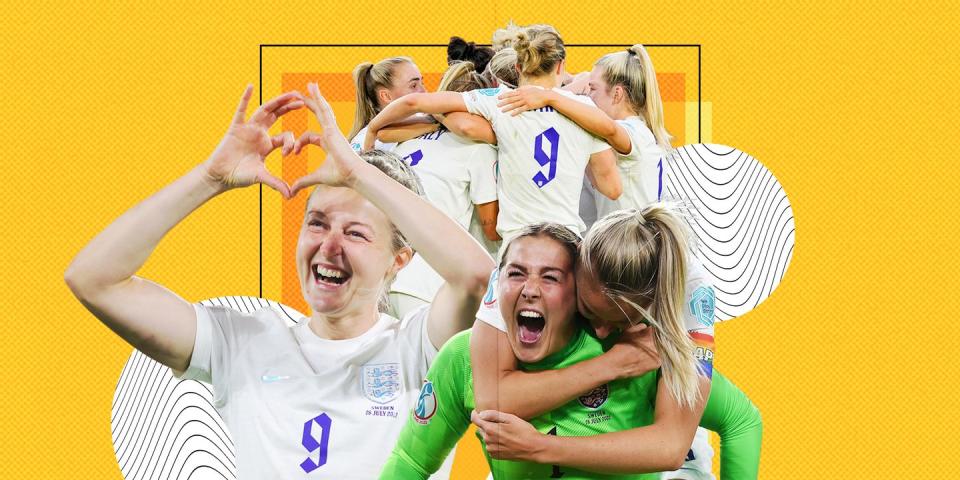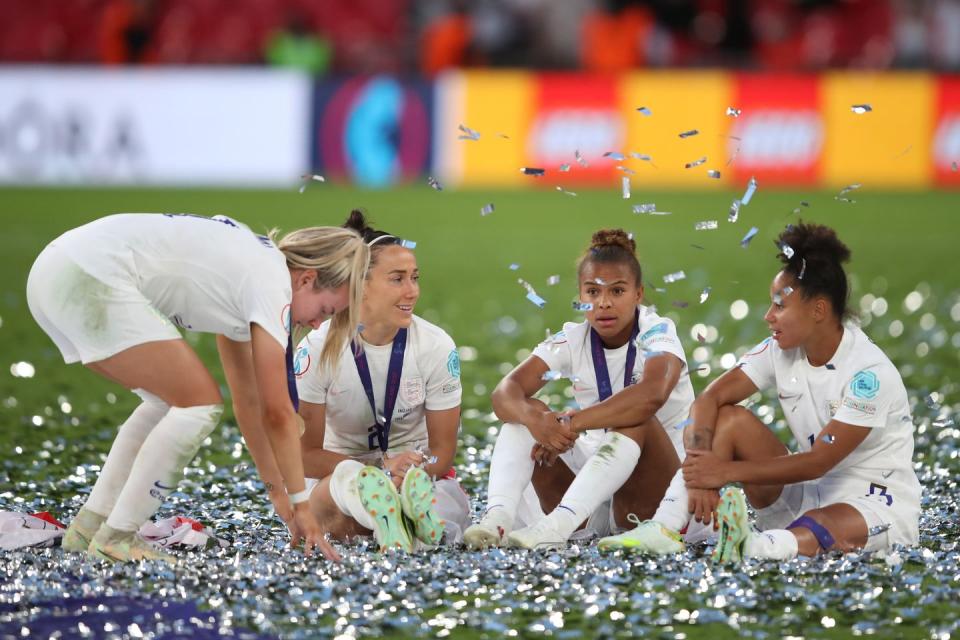The Lionesses' win last night was incredible, but there is still a lot of inequality to overcome

It was an unfamiliar sensation - a bubbling up of hope, an intense rush of pride, tears, singing, laughter. So this is what it feels like to win.
There can be little doubt that the last three-and-a-half weeks have been the most exciting for modern English women’s football yet, with record-breaking TV audiences - 20 million watched the final - and sold-out stadiums.
We have new household names: Chloe Kelly, whose extra time goal put England back in front and whose greying sports bra - revealed when she whipped her shirt off in celebration - instantly became an icon alongside the likes of David Beckham’s mohawk. Beth Mead, the Euro’s top goalscorer. Leah Williamson, the 25-year-old captain who gave an impassioned victory speech.
We had moments of pure joy: the Lionesses dancing on the pitch, raising the trophy aloft, and gatecrashing their manager Sarina Wiegman’s press conference to sing ‘Three Lions’ and jump on the tables. I watched that last clip over and over on Sunday night, my heart filled with the emotion and potential of it all.
And today, after beating Germany 2-1 at Wembley to win the tournament (did I really just type those words?), the newspaper front pages are awash with their faces: ‘No more years of hurt,’ reads one.
Except that women’s football has suffered more years of hurt than even the Lightning Seeds could have imagined. After becoming wildly successful when the men were off fighting during World War One, drawing crowds of up to 53,000, it was banned by the FA in 1921 and declared “quite unsuitable for females” who were shunted back into their domestic roles. That ban lasted for 50 years. Only now, a century later, is women’s football drawing the same sort of crowd numbers those original pioneering Lionesses did.
So, while this is a moment for serious celebration (and I hope the Lionesses roared through Sunday night and into Monday morning), it’s also one for serious action.
This could be the game-changing moment women’s football has been waiting for to level the playing field with the men’s game. We can’t afford not to capitalise on it.

There has been progress in recent years, with improved endorsements for female players, and bigger television offerings - last year saw a record-breaking deal to show Women’s Super League (WSL) domestic matches on primetime TV.
And there has been growing participation at a grassroots level, leading the Government to pledge, in March, £230m for 8,000 new pitches by 2025 and that 90 per cent of schools would give girls equal access to the sport by 2024. Before the final, the FA also announced plans to help 120,000 more schoolgirls get access to playing football.
But, in the wake of the Lionesses win, those numbers seem unambitious now. More than ever, we need a clear path to levelling-up with the men’s game.
That means equal prize money (the Lionesses will share a bonus pot of £1.3m, but £5m was promised to the men’s team had they won last year’s Euros). It means equal sponsorship and TV deals. Bigger backers pouring in cash to improve the women’s coaching, grounds, facilities, and access to physios, dieticians and psychologists.
And it means access to football for all those young girls we saw cheering in the stands, singing their little hearts out to ‘Sweet Caroline’. It’s appalling that so many schools still don’t offer them the sport - a generation largely unaware that their Lioness heroes weren’t certain they could become professional footballers. Who don’t understand that when ‘Bend it Like Beckham’ came out in 2002, the idea that girls could play football was a curiosity.
We need to keep it that way. For them, it should never be anything but the norm. It doesn’t matter whether they’re interested in football or not, only that they know it to be one of many valid life options before them. “If girls aren’t allowed to play football, just like the boys in PE after this, what are we doing? We’ve got to make sure that they are able to play. If there’s no legacy after this, what are we doing?” as commentator Ian Wright said after the final.
And there is more we can all do. The low attendance at domestic WSL matches still means some clubs struggle to make the women’s game financially viable. And in the future, we need to support our female players, wherever they sit in the league tables, and not just wake up when they reach finals.
Perhaps the biggest challenge will be cultural change. I’ve written about the Lionesses since 2015 and have lost count of the times I've been told to stop having opinions on a man’s game. That I’m a silly little girl and should shut up. But that’s nothing compared to what the women on the pitch experience. A FIFA report last month revealed that more than half the Euros players have been abused online, and Lioness Rachel Daly recently called it “a tough place”.
Yet those outdated attitudes aren’t confined to social media trolls - following Sunday’s final, former Lioness and commentator Alex Scott criticised the Premier League clubs who had refused to host matches during the women’s Euros, saying, “Back in 2018 we were begging clubs to host games for these championships and many said no. I hope they’re watching now… they never saw the vision.”
It’s a vision that has every chance of now being realised. There has long been a feeling the women's game was on the brink of major change - and there is every chance this could be it. As presenter Gabby Logan put it when wrapping-up the TV coverage last night: ‘You think it’s all over? It’s only just begun.’
Let’s hope she was right.
Claire Cohen's book 'BFF? The Truth About Female Friendship' is out now (Bantam, £16.99)
You Might Also Like

